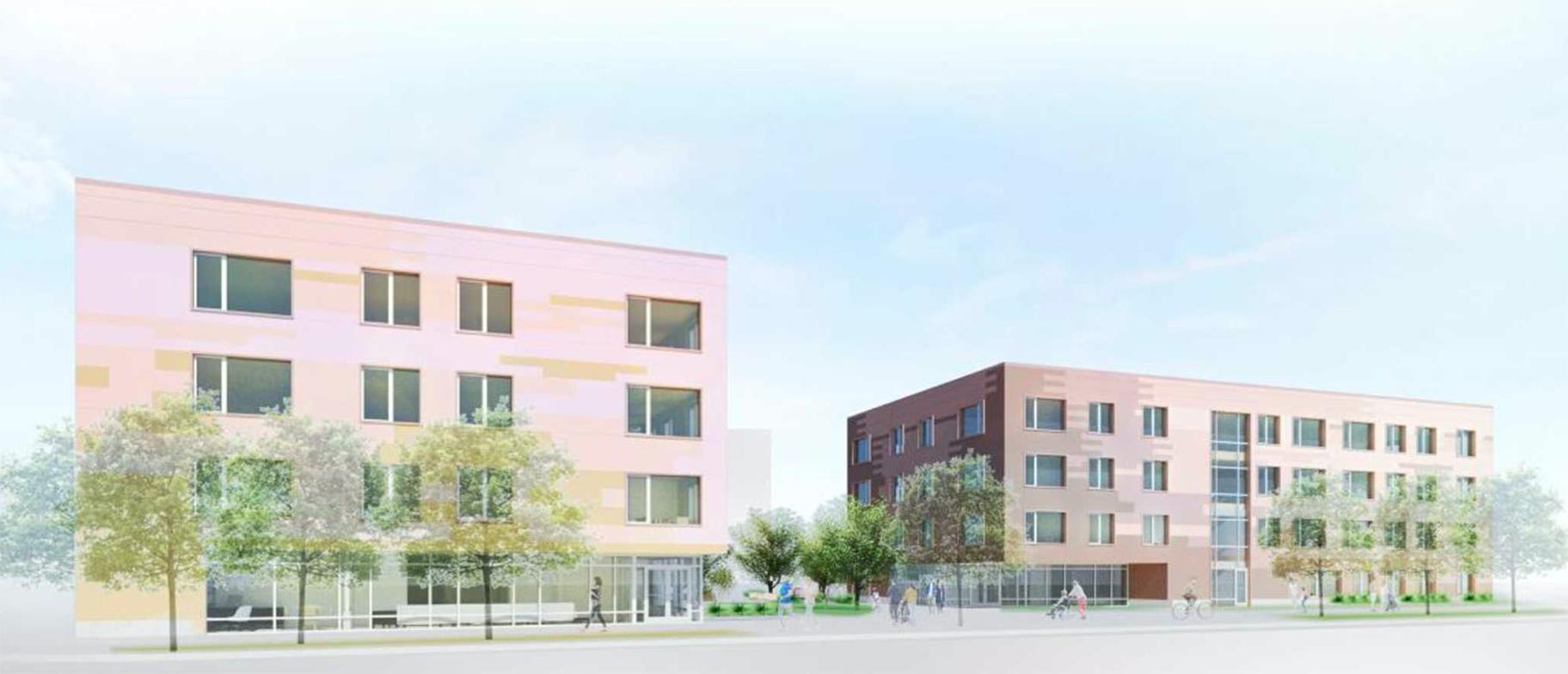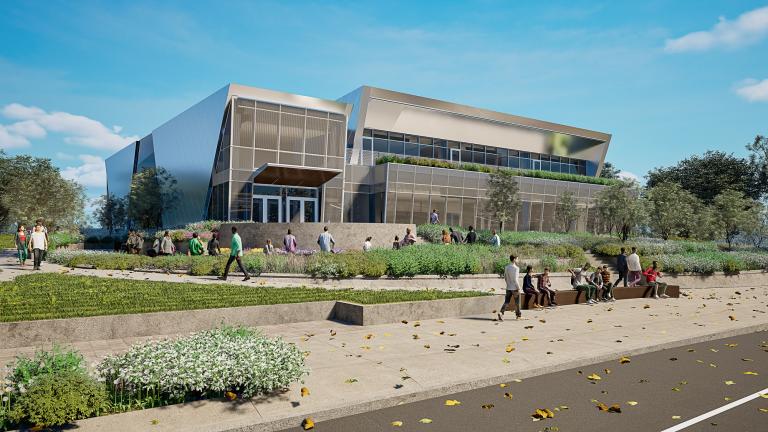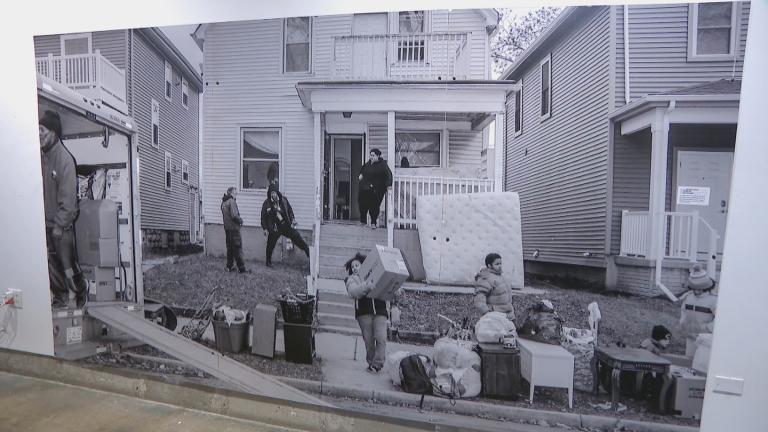 A rendering of the proposed apartment complex near Lawrence and Austin avenues in Jefferson Park. (Credit: Canopy Chicago)
A rendering of the proposed apartment complex near Lawrence and Austin avenues in Jefferson Park. (Credit: Canopy Chicago)
A plan to transform a long-vacant lot in Jefferson Park into an apartment complex has reignited the furious debate surrounding Chicago’s massive affordable housing shortfall — and whether the city’s tradition of giving aldermen the final say on developments in their wards will again block efforts to bridge that gap.
Full Circle Communities plans to build two four-story buildings with 48 units near Lawrence and Austin avenues on the Far Northwest Side, where many residents pride themselves on a lack of multifamily unit housing and relish the suburban-like vibe of their community.
The proposal at 6001 W. Lawrence Ave. would be the second development from Full Circle Communities in Jefferson Park. Construction is underway on a 75-unit complex at 5150 N. Northwest Highway — but only after years of highly charged debate and controversy that contributed to former 45th Ward Ald. John Arena’s defeat in 2019.
Supporters of the complex on Northwest Highway said it would help Jefferson Park residents stay in the neighborhood where rents had begun to rise, but opponents said the development would change the area by attracting undesirable residents and trigger an increase in crime. Supporters in turn said that criticism was racist, and the controversy raged for several years before the project received final approval in May 2019.
Full Circle Communities CEO Joshua Wilmoth said he learned from the searing experience of 5150 N. Northwest Highway, which needed a zoning change approved by the Chicago City Council to be built. The original plan for the complex called for the building to be seven stories and 100 units, which was criticized as too tall and too dense for the area.
That’s why both of the two buildings — one with 22 units and the other with 26 units — at Lawrence and Austin will be four stories, as requested by many of the critics of the plan for 5150 N. Northwest HIghway, Wilmoth said. In addition, the complex at Lawrence and Austin does not need a zoning change to be built, which Wilmoth said he was hopeful would make the entire process smoother.
“This property just checked all of the boxes,” Wilmoth said, adding that it’s close to several bus lines and grocery stores. “We took a lot of the lessons learned.”
Veterans and disabled prospective tenants will get priority for the proposed Lawrence and Austin apartments, which are set to rent for between $440 and $780 per month for a studio unit; from $475 to $1,337 per month for a one-bedroom unit; from $570 to $1,604 per month for a two-bedroom unit; and from $660 to $1,854 per month for a three-bedroom unit, according to Full Circle Communities. The development would have 36 parking spots and offer residents access to a children’s play area, business center, gym and library, according to its plan.
The complex will include three studio units, 17 one-bedroom units, 16 two-bedroom units and 12 three-bedroom units, according to the plan from Full Circle Communities.
Fifteen units will be set aside for tenants earning 30% of the area’s median income, which is $27,300 for a family of four. Fourteen units will be set aside for tenants earning 50% of the area’s median income, which is $45,500 for a family of four. Nineteen units will be set aside for tenants earning 80% of the area’s median income, which is $72,800 for a family of four, according to Full Circle Communities.
Wilmoth said he was also certain that demand for new units near Lawrence and Austin would be robust because there are 400 people on the waiting list for the 60 units set aside for low- and moderate-income residents at 5150 N. Northwest Highway.
In addition, Full Circle Communities also won $1.5 million in Low-Income Housing Tax Credits awarded by the Illinois Housing Development Authority. Those credits are a crucial part of the project’s financing, Wilmoth said.
But Wilmoth’s effort to craft a proposal that would not spark the kind of protests that greeted the plan for 5150 N. Northwest Highway was in vain.
Ald. Nicholas Sposato (38th Ward) moved in July to block the development by introducing a measure to change the zoning for the 1.5-acre piece of land that would prevent the 48-unit complex from being built without special permission from the City Council’s Zoning Committee and the full City Council.
Sposato, a former firefighter, said he opposed the proposal because he said it was — like the plan for 5150 N. Northwest Highway — too dense, too tall and a bad fit for the Far Northwest Side.
“I need some leverage,” Sposato said, adding that he would support the proposal if it was 24 or 36 units, and included at least one parking spot per unit. “It is another 5150.”
Those changes would make the development not financially feasible, Wilmoth said.
Even though Mayor Lori Lightfoot campaigned on a promise to end aldermanic prerogative, she has yet to propose changes to the city’s zoning code or directly confront the largely unwritten, decades-old practice of giving aldermen a veto over developments in their wards.
Groups working to desegregate the city by building more affordable housing on the North and Northwest sides have blamed aldermanic prerogative for concentrating housing designed for the poorest Chicagoans on the South and West sides.
An ordinance languishing in legislative limbo would limit the City Council’s ability to reject developments with units set aside for low- and moderate-income Chicagoans in wards where less than 10% of the housing stock is designated as affordable. Lightfoot has not backed that effort.
Sposato said he should have used his aldermanic prerogative to change the zoning for the property at Lawrence and Austin after he took over as 38th Ward alderman in 2015, months after a plan to build a four-story mixed-use development that included three six-unit apartment buildings fell apart. A similar development fell apart in the midst of the Great Recession.
“Shame on me for not downzoning it and preventing this,” said Sposato, acknowledging that Wilmoth emailed him about the plan in January but his office did not respond amid a crush of other requests. “He kind of snuck it in on me.”
Sposato said there were plenty of affordable apartments available for rent in the 38th Ward, which includes Dunning and parts of Portage Park on the city’s northwest border, for less than $1,200 a month in older buildings.
“These new apartments don’t seem affordable to me,” Sposato said. “I don’t understand the need for this.”
Sposato said he had agreed to hold a community meeting for residents who live on the same block to review the proposal, and said the buildings proposed by Full Circle Communities were “nice looking.”
A spokeswoman for Lightfoot declined to make Housing Commissioner Marisa Novara available for an interview about the development proposal. Before joining Lightfoot’s cabinet, Novara worked to combat segregation in Chicago and to increase the amount of affordable housing across the city.
“The mayor remains committed to making Chicago’s housing affordable for all residents in all neighborhoods. We will continue to work with [the] City Council and all stakeholders to ensure that our land-use decision[s] reflect a commitment to an inclusive, equitable Chicago,” according to a statement from the mayor’s office.
A vote on Sposato’s effort to block the development at Lawrence and Austin could come as soon as September, after the City Council’s annual August recess.
Contact Heather Cherone: @HeatherCherone | (773) 569-1863 | [email protected]








